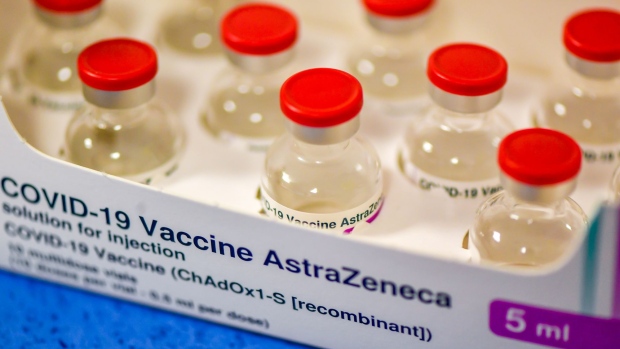Jan 27, 2021
Astra pushes back as EU warnings over vaccine delay escalate
, Bloomberg News

Drugmaker AstraZeneca Plc pushed back against the European Union on COVID-19 vaccinations, reacting to threats to its business and saying the bloc must take responsibility for delays to the rollout of the shot.
The comments from AstraZeneca Chief Executive Officer Pascal Soriot came as EU governments and company executives prepare to discuss the issue of a hold-up in shot deliveries on Wednesday evening. The European Commission wants “fundamental” information about delivery plans for the first half of the year, according to an EU official with knowledge of the situation, though there’s now a risk that the call could be canceled.
Pascal Soriot, chief executive officer of AstraZeneca Plc, poses for a photograph following a Bloomberg Television interview in London, U.K., on Thursday, Nov. 8, 2018. AstraZeneca new drugs for cancer lifted earnings above analysts' estimates as the company moved away from older products losing patent exclusivity.Tensions over the rollout have escalated since Astra warned late last week of delays at a production plant in Belgium. The EU said it would start monitoring exports of shots, and Germany signaled support for imposing limits on sales outside the bloc.
But Soriot, in an interview with European newspapers, deflected the blame to the EU. He said the company has a so-called best-effort agreement that doesn’t specify a quantity. That’s because the EU insisted on receiving the AstraZeneca vaccine about the same time as the U.K. despite putting in its order three months later.
A key part of the disagreement is the use of vaccines produced in U.K. factories. Speaking on condition of anonymity, an EU official said that Soriot’s claim that the U.K. has priority on vaccines from British plants doesn’t exist in the contract. The bloc’s executive arm is preparing a response, setting the stage for a further standoff.
The EU’s vaccination pace has been underwhelming so far, lagging way behind the U.S. and the U.K. in terms of the share of its population inoculated, according to Bloomberg’s global tracker. Soriot said that once Astra gets EU regulatory approval -- expected within days -- it will ship at least 3 million doses immediately, with a target of 17 million by February.
Governments want to get the vaccine program moving as fast as possible and help economies exit damaging lockdowns that have crippled industries from aviation to hospitality and caused growing discontent.
They’re also eager to dodge the blame, which may explain their tough words on Astra. Soriot suggested he understands that the situation is difficult for leaders across Europe, where Brussels has coordinated a vaccine-buying program.
“Everybody is getting kind of a bit, you know, aggravated or emotional about those things.” he said in the comments published in La Repubblica and other newspapers. “But I understand because the commission is managing the process for the whole of Europe.”
European Medicines Agency Executive Director Emer Cooke said Tuesday the organization is working with manufacturers to address vaccine delays, and repeated the EMA’s goal to decide this week on approval for Astra’s vaccine. Shots by Pfizer Inc. and Moderna Inc. are already authorized for use.
In an effort to alleviate supply shortages, French drugmaker Sanofi said it has agreed to help produce more than 125 million doses of the shot Pfizer developed with Germany’s BioNTech SE.
Sanofi will provide BioNTech access to its production sites in Frankfurt starting this summer, it said in a statement Wednesday. The goal is to accelerate efforts to package and distribute the vaccine, which needs to be kept at ultra-cold temperatures.
Meanwhile, the European Commission is due to present its export monitoring proposal by the end of this week. In addition to AstraZeneca’s vaccine, the one from Pfizer and BioNTech is also made within the bloc, with some of the production sent outside the EU.
While the details of the EU’s plans have yet to be revealed, the World Trade Organization would not prevent vaccine export restrictions or even an outright ban. Its rules have exemptions in the event of critical shortages of essential products or if action is necessary to protect human life and health.
Export Proposals
- The risk there is that protectionist measures could add another layer of complexity for pharmaceutical companies, or spark retaliation by other countries, disrupting the flow of life-saving shots.
- But EU Trade Commissioner Valdis Dombrovskis dismissed the idea that a notification system for vaccine exports would limit them in any way.
- “We’re not planning to impose an export ban or export restrictions,” Dombrovskis told reporters on Tuesday in Brussels. “Primarily it’s a matter of transparency on the deliveries.”
--With assistance from Bryce Baschuk, Kait Bolongaro and Suzi Ring.


